Book contents
- Frontmatter
- Contents
- Acknowledgements
- Introduction
- 1 An Elitist Project
- 2 Federalism Old and New
- 3 Cryptofederalism
- 4 Unintended Consequences of Cryptofederalism
- 5 The Mirage of Social Europe
- 6 The Democratic Deficit and All That
- 7 The Obsolescence of the Traditional Integration Methods
- 8 Unity in Diversity
- References
- Index
8 - Unity in Diversity
Published online by Cambridge University Press: 05 August 2012
- Frontmatter
- Contents
- Acknowledgements
- Introduction
- 1 An Elitist Project
- 2 Federalism Old and New
- 3 Cryptofederalism
- 4 Unintended Consequences of Cryptofederalism
- 5 The Mirage of Social Europe
- 6 The Democratic Deficit and All That
- 7 The Obsolescence of the Traditional Integration Methods
- 8 Unity in Diversity
- References
- Index
Summary
Beyond Straight-Line Evolution
The traditional approach to European integration is inspired by a unilinear evolutionary image. This notion of orthogenesis (as biologists call straight-line evolution) emerged at a time when the EC comprised a small group of fairly homogeneous West European states. In the early stages of the integration process it was not unreasonable to assume that the European Community would necessarily evolve, sooner or later, into a politically integrated bloc, perhaps even into something like a nation (see chapter 2). That assumption is no longer tenable in a Union of twenty-seven, or more, members at vastly different stages of socioeconomic development, with different geopolitical concerns, and correspondingly diverse policy priorities. Under present conditions, not orthogenesis but evolution with several side-branches seems to be the appropriate model. As a matter of fact, surveying the general pattern of European integration since the end of World War II, one can see several distinct branches – a number of, often overlapping, state groupings established for purposes of cooperation in a variety of fields: political, economic, protection of human rights, security, science, and technology. An important example is the Council of Europe founded in 1949, which at present has more than forty member countries. The Council may concern itself with all political, economic, and social matters of general European interest and thus has an even broader mandate than the European Union. True, it does not have the power to make binding laws. The two instruments at the Council's disposal are non-binding resolutions, and conventions effective only between the states that ratified them.
- Type
- Chapter
- Information
- Europe as the Would-be World PowerThe EU at Fifty, pp. 205 - 234Publisher: Cambridge University PressPrint publication year: 2009



